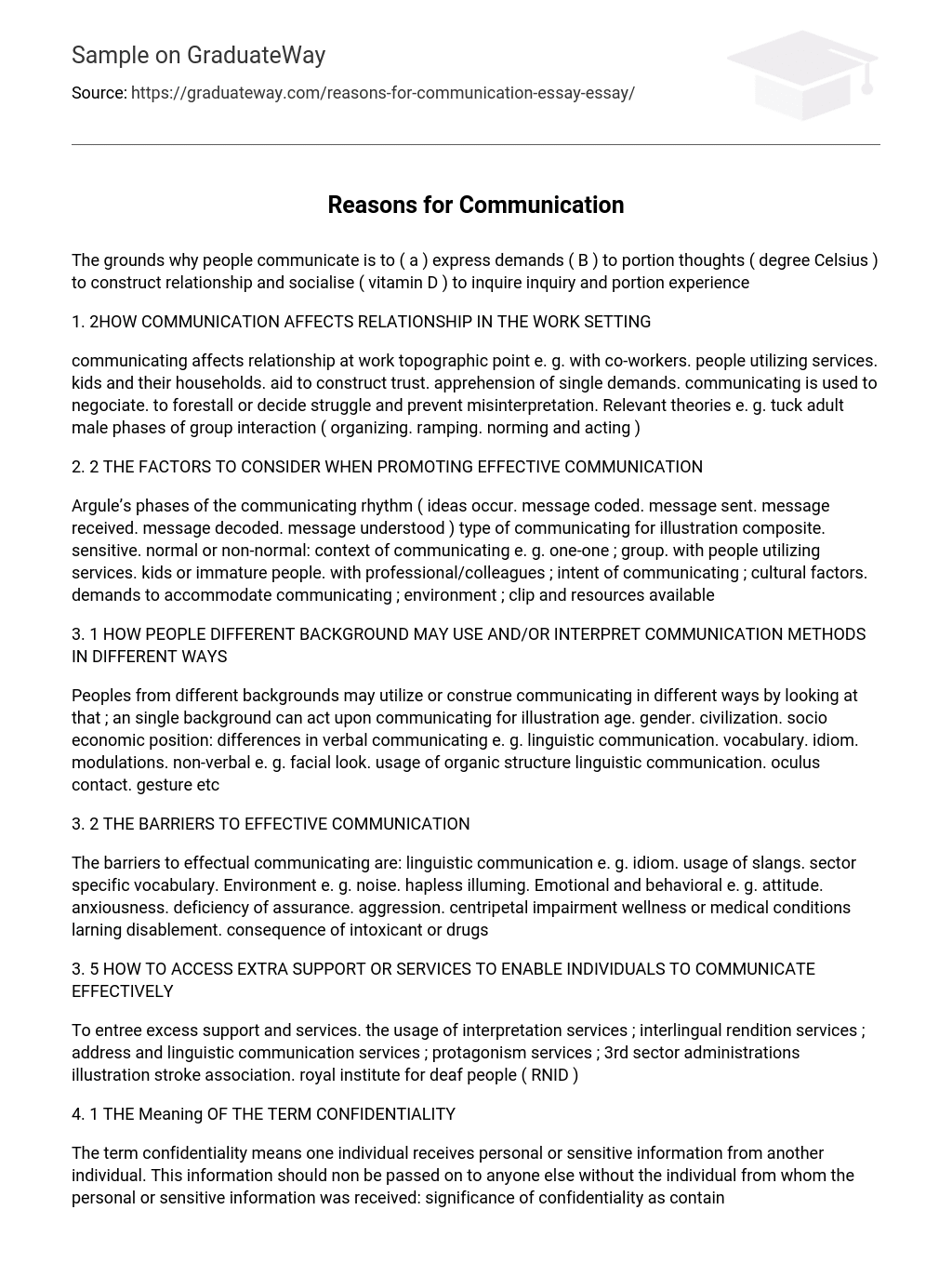HOW COMMUNICATION AFFECTS RELATIONSHIP IN THE WORK SETTING
Communication affects relationships at the workplace, for example, with co-workers, people using services, children and their families. It helps to build trust, understanding of individual needs, and is used to negotiate, prevent or resolve conflicts and prevent misinterpretation. Relevant theories include Tuckman’s stages of group interaction (forming, storming, norming and performing).
THE FACTORS TO CONSIDER WHEN PROMOTING EFFECTIVE COMMUNICATION
Argyle’s stages of the communication cycle (ideas occur, message coded, message sent, message received, message decoded, message understood), type of communication (for example, complex, sensitive, normal, or non-normal), context of communication (one-to-one, group, with people using services, children or young people, with professionals/colleagues), purpose of communication, cultural factors, communication needs to be adapted, environment, time and resources available.
HOW PEOPLE FROM DIFFERENT BACKGROUNDS MAY USE AND/OR INTERPRET COMMUNICATION METHODS IN DIFFERENT WAYS
People from different backgrounds may use or interpret communication in different ways, considering that an individual’s background can influence communication. For example, age, gender, culture, socio-economic status can affect verbal communication, such as language, vocabulary, idiom, intonation, and non-verbal communication, such as facial expression, use of body language, eye contact, gestures, etc.
THE BARRIERS TO EFFECTIVE COMMUNICATION
The barriers to effective communication are: language (idiom, use of slangs, sector-specific vocabulary), environment (noise, poor lighting), emotional and behavioral (attitude, anxiety, lack of confidence, aggression), sensory impairment, health or medical conditions, learning disability, and the effects of alcohol or drugs.
HOW TO ACCESS EXTRA SUPPORT OR SERVICES TO ENABLE INDIVIDUALS TO COMMUNICATE EFFECTIVELY
To access extra support and services, use interpretation services, translation services, speech and language services, advocacy services, third sector organizations, such as the Stroke Association, Royal National Institute for Deaf People (RNID).
THE MEANING OF THE TERM CONFIDENTIALITY
The term confidentiality means that one person receives personal or sensitive information from another person. This information should not be passed on to anyone else without the consent of the person from whom the personal or sensitive information was received. The significance of confidentiality is contained in principles of current legislation, such as the Data Protection Act of 1998.
THE POTENTIAL TENSIONS BETWEEN MAINTAINING AN INDIVIDUAL’S CONFIDENTIALITY AND DISCLOSING CONCERNS
Maintaining confidentiality in day-to-day communication in different interpersonal situations, e.g., when an adult receives personal information about other adults or co-workers, or when a child or young person receives personal or sensitive information about an adult.
Following policies and procedures in one’s own work setting, for example, policies for sharing information, situations where unconditional confidentiality cannot be maintained, support and guidance regarding confidential information, the role of the manager or supervisor, referral, and training on the types of information to be collected, recorded, and stored.
There is a potential tension caused by confidentiality and the need to disclose information when necessary, understanding when information may be shared without consent, the concept of the need to know, and the need for clear policies and protocols in information sharing.
Responsibilities and duties of one’s work role include contractual obligations, such as hours, line of reporting, specific roles and responsibilities, e.g., behavioral support, supporting children and young people with special educational needs, and supporting bilingual children and young people. Compliance with work setting policies and procedures, e.g., behavior, child and young people protection, and health and safety. Keeping up to date with changes to procedures and practices.





